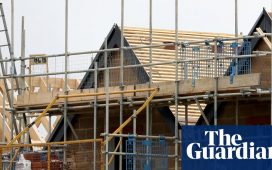Stay informed with free updates
Simply sign up to the Property sector myFT Digest — delivered directly to your inbox.
Britain’s housing market is set for a busy autumn after the Bank of England cut interest rates this month for the first time since Covid-19 struck, with the number of homes listed for sale hitting a seven-year high.
The stock of homes for sale in the UK was 14 per cent higher over the past month compared with the same time in 2023, according to analysis published by property website Zoopla on Wednesday.
More buyers and sellers have been coming back to the market after almost two years of muted activity caused by higher borrowing costs, as the BoE raised its benchmark rate to a 16-year high of 5.25 per cent in a bid to tame inflation.
As interest rates fall — financial markets are pricing in about two more quarter-point cuts by the BoE this year — Zoopla expects the number of home sales to end 2024 roughly 10 per cent higher than 2023. But it warned that the surge of supply meant sellers should not expect high prices.
“With this level of supply, people have got to keep their feet on the ground on price,” said Richard Donnell, executive director at Zoopla. “Especially in the wider south of England, there is affordability pressure that means buyers will use that choice to keep negotiating price.”
The number of sellers cutting their asking prices by 5 per cent or more was at an elevated level of about 20 per cent, and these properties took more than 2.5 times longer to sell than properties that had not been discounted, Zoopla added.
House prices rose by 2.7 per cent in the year to June, unchanged from May, according to official figures, leaving the average property at £288,000.
The average five-year fixed rate mortgage with a 25 per cent deposit has fallen to 4.55 per cent from 5.55 per cent a year ago, with the cheapest rates now just below 4 per cent, according to Rightmove’s mortgage tracker.
However, analysts do not expect a sharp fall in mortgage rates, meaning buyers’ budgets will remain squeezed.
A typical mortgage now costs 39 per cent of the median full-time salary, up from 30 per cent before the Covid-19 pandemic, according to Capital Economics.
“With mortgage affordability so stretched, we doubt households will continue to spend more of their incomes on mortgage costs,” said Ruth Gregory, deputy chief UK economist at the research company.
Still, an increase in listings and transactions is welcome for those who struggled to move during the market downturn — and for businesses that depend on property sales such as estate agents, lenders and housebuilders.
Tony Gambrill, regional sales director at Chestertons, said the estate agency was “seeing house-hunters who feel that market conditions have improved overall [with] lower interest and mortgage rates”.
“This additional buyer confidence will result in demand remaining high well into the autumn,” he added.










